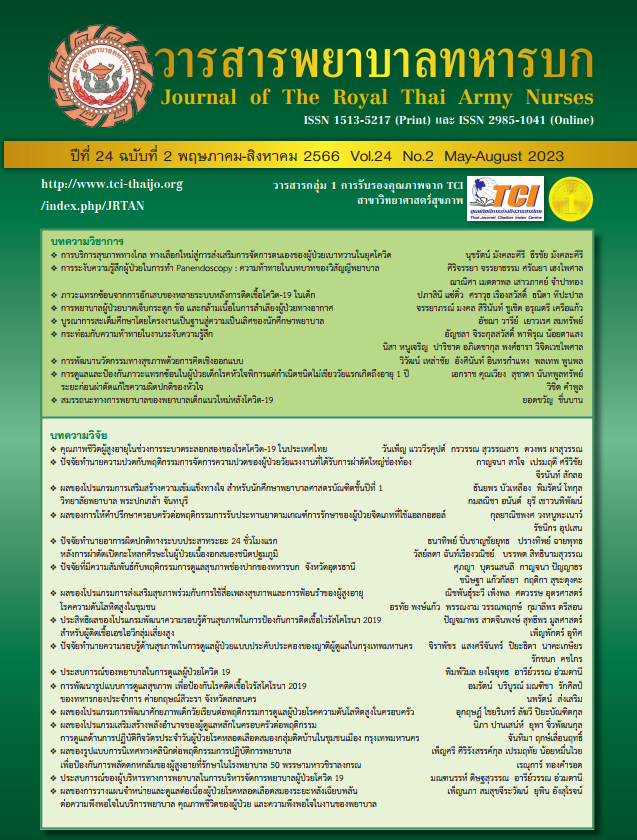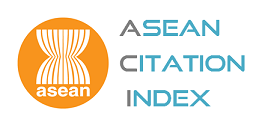การประยุกต์ใช้แนวคิดจิตตปัญญาศึกษาเพื่อพัฒนาทักษะ การพยาบาลสุขภาพจิตและจิตเวชของนักศึกษาพยาบาล
คำสำคัญ:
แนวคิดจิตตปัญญาศึกษา, นักศึกษาพยาบาล, สุขภาพจิตและจิตเวช, ความเอื้ออาทรบทคัดย่อ
การวิจัยเชิงปฏิบัติการในห้องเรียนนี้ มีวัตถุประสงค์เพื่อศึกษาผลของการประยุกต์ใช้แนวคิดจิตตปัญญาศึกษา ในการ จัดการเรียนการสอนวิชาปฏิบัติการพยาบาลสุขภาพจิตและจิตเวช เพื่อเตรียมนักศึกษาให้มีความพร้อมในการฝึกปฏิบัติงานทั้งด้าน จิตใจ อารมณ์ ความรู้ ทักษะและทัศนคติ สามารถวางแผนและให้การการดูแลผู้ป่วย ตามกระบวนการพยาบาลสุขภาพจิตและจิตเวช ด้วยความเอื้ออาทร กลุ่มตัวอย่างเป็นนักศึกษาพยาบาลปีที่ 3 ที่ฝึกภาคปฏิบัติวิชาการพยาบาลสุขภาพจิตและจิตเวช จำนวน 24 คน ที่อยู่ในความดูแลของผู้วิจัย เครื่องมือที่ใช้ในการวิจัยประกอบด้วย กิจกรรมการเรียนการสอนที่ประยุกต์แนวคิดจิตตปัญญาศึกษา ในการเตรียมความพร้อมของนักศึกษาและการฝึกปฏิบัติในหอผู้ป่วย การเก็บรวบรวมข้อมูลใช้วิธีการเชิงคุณภาพ โดยการสังเกต พฤติกรรมการแสดงออกของนักศึกษา การสอบถาม แผนการพยาบาลและการบันทึกความรู้สึกของนักศึกษา วิธีการวิเคราะห์ข้อมูล ใช้การวิเคราะห์เนื้อหาและจัดกลุ่มข้อมูล
ผลการวิจัยพบว่า หลังการใช้กิจกรรมการสอนตามแนวคิดจิตตปัญญาศึกษา นักศึกษามีสมาธิ การสื่อสารปฏิสัมพันธ์ที่ดี ขึ้น ตระหนักรู้ในตนเอง เข้าใจและยอมรับความแตกต่างระหว่างบุคคล มีความเอื้ออาทรเห็นใจผู้อื่น คลายความวิตกกังวลและมี ความสุขในการฝึกปฏิบัติงาน สามารถสร้างสัมพันธภาพและทำให้ผู้ป่วยเกิดความไว้วางใจ สามารถวางแผนและให้การดูแลผู้ป่วย ตามกระบวนการการพยาบาลสุขภาพจิตและจิตเวชได้อย่างมีประสิทธิภาพด้วยความเอื้ออาทร
Downloads
เอกสารอ้างอิง
Kosolchuenvijit J. Caring: Central Focus of Humanistic Care. Journal of Boromarajonani College of Nursing. 2013; 15(2): 134-41.
World Health Organization. Mental Health Atlas 2020. Geneva; 2021.
Kamutthachat P. Case Studies of Medical Conflict Management in a Hospital. Public Health & Laws Journal. 2016; 2(2): 191-208. (in Thai)
Sherman GL. Transformative Learning and Well-Being for Emerging Adults in Higher Education. Journal of Transformative Education. 2021; 19(1): 29-49.
Onsri P. Contemplative education: education for human development in 21st century. Journal of The Royal Thai Army Nurses. 2014; 15(1): 7-11. (in Thai).
Phoemkhuen A, Kumsiripiman K, Mangkhang C. Applying Contemplative Education to develop student quality in Civic Duty courses at Darapittayakom school, Uttaradit province. Journal of Education Naresuan University. 2017; 19(4): 265-75. (in Thai)
Tang YY, Hölzel B, Posner M. The neuroscience of mindfulness meditation. Nature Reviews Neuroscience. 2015; 16(4): 213–25.
Anantreechai S, editor. 60 Contemplative Education Ideas in Classrooms: introduction. Nonthaburi: Vatcharin P.P Ltd. Printing; 2022. (in Thai)
Barrs KS. Spiritual Care in Holistic Nursing Education: A Spirituality and Health Elective Rooted in T.R.U.S.T. and Contemplative Education. Journal of Holistic Nursing. 2020; 38(1): 122–30.
Paksa P. Contemplative Education: learning activity for students in higher education. Journal of Education, Mahasarakham University. 2020; 14(4): 7-18. (in Thai)
Choosang S, Nillapan M. The Paradigm of Contemplative Education Enhance Humanized Care of Nursing Student. Silapakorn Educational Research Journal. 2021; 13(1): 9–23. (in Thai)
Nuangchalerm P, Prachagool V. Promoting Transformative Learning of Preservice Teacher through Contemplative Practices. Asian Social Science 2010; 6(1): 95–9.
Eyre A. The Manchester Attack Support Group Programme: modelling a psychosocial response to collective trauma. Journal of Psychosocial Studies 2022; 15(1): 16-35.
Hölzel BK, Lazar SW, Gard T, Schuman-Olivier Z, Vago DR, Ott U. How Does Mindfulness Meditation Work? Proposing Mechanisms of Action From a Conceptual and Neural Perspective. Perspectives on Psychological Science. 2011; 6(6): 537-59.
Sornlob P, Prompuk B, Thiraphong, N. Effects of Contemplative Education Program on Self Awareness and Happiness in Learning of Nursing Students. Journal of Nurses Association of Thailand Northern Region. 2020; 26(1): 41–53. (in Thai)
Sornlob P, Sroisong S, Fuongtong P, Teerapong N. Effects of Contemplative Education on Happiness Learning and Holistic Nursing among Nursing Students. Health Science Journal Boromarajonani College of Nursing Sanpasithiprasong. 2022; 6(1): 112–26. (in Thai)
Anan K, Boontham A, Cheaplamp S, Songsawangthum M, Chaopipat Y, Bualuang T. The Development of Empathy in nursing students using the Contemplative Education. Journal of The Royal Thai Army Nurses. 2018; 19 Supplement: 68–77. (in Thai)
Polsingchan S, Rungruang K. The Integration of Contemplative Education Concepts and Problem-based Learning Method in a Selected Topic of Ethics and Laws in Nursing Profession Subject for Nursing Student. Nursing Journal of the Ministry of Public Health. 2021; 30(2): 23-25. (in Thai)
Vipavanich S. Role of Psychiatric Nurses in Therapeutic Relationship Building. Regional Health Promotion Center 9 Journal. 2021; 15(38): 732-43. (in Thai)
Liao HC, Huang CY, Wang YH. Development and psychometric testing of a scale measuring caring behaviors for healthcare students and providers, Medical Education Online. 2022; 27(1): 1-11. doi:10.1080/10872981.2022. 2066496
Zhang J, Zhou X, Wang H, Luo Y, Li W. Development and Validation of the Humanistic Practice Ability of Nursing Scale. Asian Nursing Research. 2021; 15(2): 105–12.
Rasheed SP, Sundus A, Younas A, Fakhar J, Inayat S. Development and Testing of a Measure of Self-awareness Among Nurses. Western Journal of Nursing Research. 2020; 43(1): 36-44.
ดาวน์โหลด
เผยแพร่แล้ว
รูปแบบการอ้างอิง
ฉบับ
ประเภทบทความ
สัญญาอนุญาต
ลิขสิทธิ์ (c) 2023 วารสารพยาบาลทหารบก

อนุญาตภายใต้เงื่อนไข Creative Commons Attribution-NonCommercial-NoDerivatives 4.0 International License.
บทความหรือข้อคิดเห็นใดใดที่ปรากฏในวารสารพยาบาลทหารบกเป็นวรรณกรรมของผู้เขียน ซึ่งบรรณาธิการหรือสมาคมพยาบาลทหารบก ไม่จำเป็นต้องเห็นด้วย
บทความที่ได้รับการตีพิมพ์เป็นลิขสิทธิ์ของวารสารพยาบาลทหารบก
The ideas and opinions expressed in the Journal of The Royal Thai Army Nurses are those of the authors and not necessarily those
of the editor or Royal Thai Army Nurses Association.







